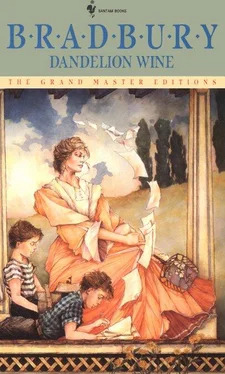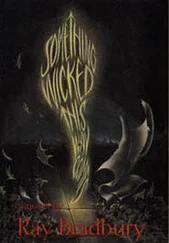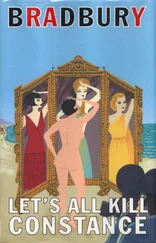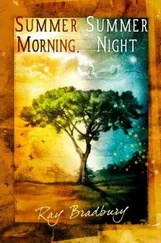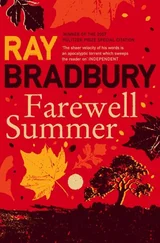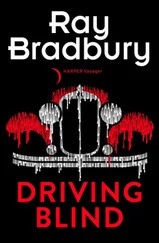“Sure,” said Tom.
“Well, that was the Lonely One, dumb! Read the papers! After ten long years escaping, old Lavinia Nebbs up and stabbed him with a handy pair of sewing scissors. I wish she’d minded her own business.”
“You want she’d laid down and let him squeeze her windpipe?”
“No, but the least she could’ve done is gallop out of the house and down the street screaming ‘Lonely One! Lonely One!’ long enough to give him a chance to beat it. This town used to have some good stuff in it up until about twelve o’clock last night. From here on, we’re vanilla junket.”
“Let me say it for the last time, Charlie; I figure the Lonely One ain’t dead. I saw his face, you saw his face, Doug saw his face, didn’t you, Doug?”
“What? Yes. I think so. Yes.”
“Everybody saw his face. Answer me this, then: Did it look like the Lonely One to you?”
“I . . .” said Douglas, and stopped.
The sun buzzed in the sky for about five seconds.
“My gosh . . .” whispered Charlie at last.
Tom waited, smiling.
“It didn’t look like the Lonely One at all,” gasped Charlie. “It looked like a man.”
“Right, yes, sir, a plain everyday man, who wouldn’t pull the wings off even so much as a fly, Charlie, a fly! The least the Lonely One would do if he was the Lonely One is look like the Lonely One, right? Well, he looked like the candy butcher down front the Elite Theater nights.”
“What you think he was, a tramp coming through town, got in what he thought was an empty house, and got killed by Miss Nebbs?”
“Sure!”
“Hold on, though. None of us know what the Lonely One should look like. There’s no pictures. Only people ever saw him wound up dead.”
“You know and Doug knows and I know what he looks like. He’s got to be tall, don’t he?”
“Sure . . .”
“And he’s got to be pale, don’t he?”
“Pale, that’s right.”
“And skinny like a skeleton and have long dark hair, don’t he?”
“That’s what I always said.”
“And big eyes bulging out, green eyes like a cat?”
“That’s him to the t.”
“Well, then.” Tom snorted. “You saw that poor guy they lugged out of the Nebbs’s place a couple hours ago. What was he?”
“Little and red-faced and kind of fat and not much hair and what there was was sandy. Tom, you hit on it! Come on! Call the guys! You go tell them like you told me! The Lonely One ain’t dead. He’ll still be out lurkin’ around tonight.”
“Yeah,” said Tom, and stopped, suddenly thoughtful.
“Tom, you’re a pal, you got a real brain. None of us would’ve saved the day this way. The summer was sure going bad up to this very minute. You got your thumb in the dike just in time. August won’t be a total loss. Hey, kids!”
And Charlie was off, waving his arms, yelling.
Tom stood on the sidewalk in front of Lavinia Nebbs’ house, his face pale.
“My gosh!” he whispered. “What’ve I gone and done now!”
He turned to Douglas.
“I say, Doug, what’ve I gone and done now?”
Douglas was staring at the house. His lips moved.
“I was there, last night, in the ravine. I saw Elizabeth Ramsell. It came by here last night on the way home. I saw the lemonade glass there on the rail. Just last night it was. I could drink that, I thought . . . I could drink that . . .”
She was a woman with a broom or a dustpan or a washrag or a mixing spoon in her hand. You saw her cutting piecrust in the morning, humming to it, or you saw her setting out the baked pies at noon or taking them in, cool, at dusk. She rang porcelain cups like a Swiss bell ringer, to their place. She glided through the halls as steadily as a vacuum machine, seeking, finding, and setting to rights. She made mirrors of every window, to catch the sun. She strolled but twice through any garden, trowel in hand, and the flowers raised their quivering fires upon the warm air in her wake. She slept quietly and turned no more than three times in a night, as relaxed as a white glove to which, at dawn, a brisk hand will return. Waking, she touched people like pictures, to set their frames straight.
But, now . . . ?
“Grandma,” said everyone. “Great-grandma.”
Now it was as if a huge sum in arithmetic were finally drawing to an end. She had stuffed turkeys, chickens, squabs, gentlemen, and boys. She had washed ceilings, walls, invalids, and children. She had laid linoleum, repaired bicycles, wound clocks, stoked furnaces, swabbed iodine on ten thousand grievous wounds. Her hands had flown all around about and down, gentling this, holding that, throwing baseballs, swinging bright croquet mallets, seeding black earth, or fixing covers over dumplings, ragouts, and children wildly strewn by slumber. She had pulled down shades, pinched out candles, turned switches, and—grown old. Looking back on thirty billions of things started, carried, finished and done, it all summed up, totaled out; the last decimal was placed, the final zero swung slowly into line. Now, chalk in hand, she stood back from life a silent hour before reaching for the eraser.
“Let me see now,” said Great-grandma. “Let me see . . .”
With no fuss or further ado, she traveled the house in an ever-circling inventory, reached the stairs at last, and, making no special announcement, she took herself up three flights to her room where, silently, she laid herself out like a fossil imprint under the snowing cool sheets of her bed and began to die.
Again the voices:
“Grandma! Great-grandma!”
The rumor of what she was doing dropped down the stairwell, hit, and spread ripples through the rooms, out doors and windows and along the street of elms to the edge of the green ravine.
“Here now, here!” The family surrounded her bed.
“Just let me lie,” she whispered.
Her ailment could not be seen in any microscope; it was a mild but ever-deepening tiredness, a dim weighing of her sparrow body; sleepy, sleepier, sleepiest.
As for her children and her children’s children—it seemed impossible that with such a simple act, the most leisurely act in the world, she could cause such apprehension.
“Great-grandma, now listen—what you’re doing is no better than breaking a lease. This house will fall down without you. You must give us at least a year’s notice!”
Great-grandma opened one eye. Ninety years gazed calmly out at her physicians like a dust-ghost from a high cupola window in a fast-emptying house. “Tom . . . ?”
The boy was sent, alone, to her whispering bed.
“Tom,” she said, faintly, far away, “in the Southern Seas there’s a day in each man’s life when he knows it’s time to shake hands with all his friends and say good-bye and sail away, and he does, and it’s natural—it’s just his time. That’s how it is today. I’m so like you sometimes, sitting through Saturday matinees until nine at night when we send your dad to bring you home. Tom, when the time comes that the same cowboys are shooting the same Indians on the same mountaintop, then it’s best to fold back the seat and head for the door, with no regrets and no walking backward up the aisle. So, I’m leaving while I’m still happy and still entertained”
Douglas was summoned next to her side.
“Grandma, who’ll shingle the roof next spring?”
Every April for as far back as there were calendars, you thought you heard woodpeckers tapping the housetop. But no, it was Great-grandma somehow transported, singing, pounding nails, replacing shingles, high in the sky!
“Douglas,” she whispered, “don’t ever let anyone do the shingles unless it’s fun for them.”
“Look around come April, and say, ‘Who’d like to fix the roof?’ And whichever face lights up is the face you want, Douglas. Because up there on that roof you can see the whole town going toward the country and the country going toward the edge of the earth and the river shining, and the morning lake, and birds on the trees down under you, and the best of the wind all around above. Any one of those should be enough to make a person climb a weather vane some spring sunrise. It’s a powerful hour, if you give it half a chance . . .”
Читать дальше
